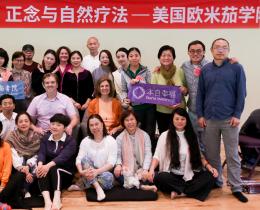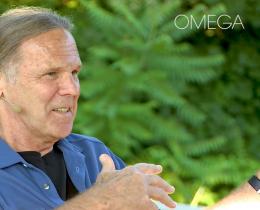Omega: Which came first for you, yoga or an online presence?
David: Yoga came well before an online presence. To be totally honest, you could safely say that I had no idea what it meant to be online when this business started 11 years ago. I started doing yoga in my early 20s and that was 22 years ago. I was traveling the world. All I wanted to do was explore back then and feel free. I still have that spirit in me.
Omega: Your first yoga class was motivated by an injury. Can you speak about how yoga helped you to connect with your body?
David: During my school years, I was 100 percent jock. I played a lot of contact sports like football and hockey. I had the most supportive parents who took me to tournaments all over. But I was not taking care of myself. Through a combination of sports and having a few jobs where I was doing some heavy lifting, my back went out at 16. It recurred a few times until I started to understand what elements of yoga could start to heal it and keep it from going into that pain state again.
Omega: DoYogaWithMe.com now has almost 90,000 subscribers on YouTube and 200,00 members on your website. What was it like to start this business?
David: It’s so unimaginable. When we started, there was really only one other website that offered yoga classes online. I started with two cameras in the local park and would film myself on my yoga mat. Then, I would take the footage home, do a voice over, edit it, and put it on the website.
I had never taken a business course, nor an online video course. It was just me, guessing what to do. Then, it just happened. Traffic increased and I started to get real engagement from people around the world. From then on, it was a combination of luck, hard work, and really good timing.
One of the common challenges for me is accepting where this business is now and owning it. I have a constant state of imposter syndrome. I often feel like I don’t belong. But because of that, there is a certain level of vulnerability and honesty that comes through in the videos.
People who want to get involved [and work with the company], such as yoga teachers, feel that same desire to give from a real place within themselves. They feel like they genuinely want to help people. I think that when you build a team around principles like that, then you'll just attract the right people.
Omega: What are some of the challenges in filming yoga and how did you learn to make high-quality videos?
David: I personally filmed all the classes until about a year and a half ago. Technically, it was not easy, Lighting is challenging in every environment. So I had to learn to adapt. When you arrive in an environment, whether it's indoors or outdoors, developing an eye for what the camera sees takes time. It takes experience. You have to know what to do and what tools you need to do it.
Audio is another element altogether. It takes a specialist in both video and audio. I learned by going online to ask questions. I recommend finding people who can give you advice.
The challenges are numerous, like when the microphone is picking up all the environmental sounds of people walking by, dogs barking, planes flying over. You don't want any of those sounds on your video.
If you go to a beautiful spot and sit there and listen for two hours, your mic will pick up all of those sounds all the time. The challenges are numerous, and you've got to be okay working with all of them on the fly and have the tools and the patience to be able to adapt.
Now, the business has grown enough that I have an amazing full-time videographer.
Omega: With so many online businesses trying to win the attention of viewers, what does it look like to build your audience in a way that feels authentic?
David: Number one is defining your values and your mission. The team has to be aligned with the core value system in everything that they do, especially if they're communicating something to the world around them.
Then you have to be smart about how you approach every project that you do and why. Constantly ask, why are we doing this particular project? The answers have to be clear to everyone involved in that project.
And finally, know your competition. What makes you different from them?
It can be obvious things and it can be subtle things. In fact, when you look at marketing, it is often the more subtle touches that your audience will resonate with.
When they arrive at your website, it's the subtle underlying feel of the website that they resonate with immediately. Aspects like the font, the spacing, the color, the size of the text, the size of the video, the specific words that you use when you describe things, the way the video begins, the way the teacher addresses the students right when the video starts—all of these things add to the experience of every single person that comes to the website.
We also have very specific topics on our website. We just put out a yoga for eating disorders program. That's a great example. We are genuinely trying to reach out to our audience and give them what they need to feel good, to heal, to live happier lives.
Omega: How do you connect with your viewers when most of them are practicing alone in their living rooms?
David: The most important difference from an in-person class is that students are not motivated by others around them. There is a large percentage of the class for whom it is hard to look at the screen. They won’t have the typical visual guidance.
So, the teacher needs to be strong at cueing. They must speak efficiently, with clarity around when you breathe and how to move.
Usually, when I bring a teacher in, I’ve taken classes with them already. I know their strengths. I want them to do what they do best.
Humility is a large part of teaching. If you can embody it in your teaching, students will be drawn to that vulnerability. It feels real. If you can actually be real, honest, and vulnerable on camera, you automatically gain trust.
Omega: What advice would you give to someone who has a unique practice or skill to offer and wants to reach a broad audience, but is unsure where to begin?
David: I think the first thing is staying true to your purpose. It will help you will remain a healthier and more positive person. Passion is an amazing thing to have when you start a business. Honor that.
As soon as possible, get people around you who complement your skill set and who are a lot better than you at whatever they specialize in. They can be your mirror. They can reflect ideas. They can challenge you on ideas because you're not always right.
One of the biggest characteristics to have as a founder is to be open to the possibility that you are wrong a lot of the time. It’s important to listen, and by listening, I mean you can monitor traffic, do surveys, or you can phone people the old-fashioned way.
The best thing you can do is get out of your head. Stop thinking that you know what people want and ask them.
If you don't have a product that people want, then you've got to figure out what they want. It's as simple as that.
Omega: What is on the horizon for online businesses like yours?
David: I've been doing a lot of research into health and well-being for a long time. One of the things that has been both shocking and somewhat encouraging for me is that so many of the chronic illnesses that exist in the world are on the rise.
The world desperately needs people who genuinely care and have something that they can offer to help people feel better on a daily basis.
The challenge is creating a business model around how you're going to be helping people. We started off free. You might want to start free for a few months and then build a subscription model.
The world needs you if you have something to offer. If you can be one of those people, go for it.



